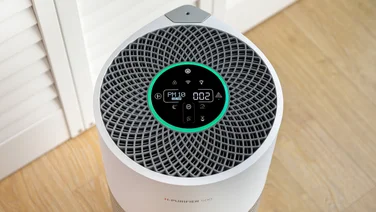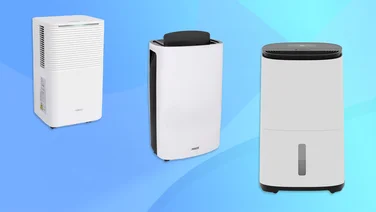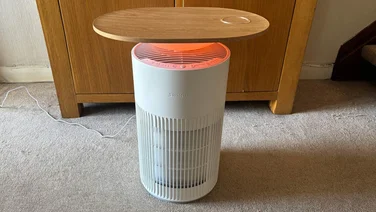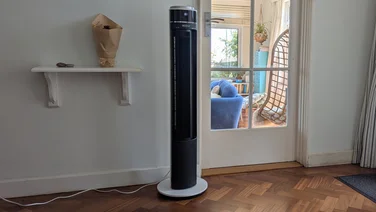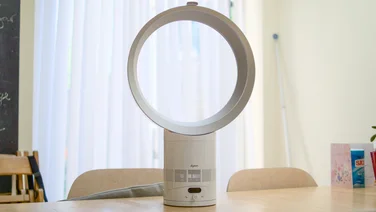To help us provide you with free impartial advice, we may earn a commission if you buy through links on our site. Learn more

Air purifiers address the issue of indoor air pollution, filtering out contaminants like dust, pollen, pet dander, mould spores, and even airborne pathogens. Their existence is driven by a growing awareness of the direct impact of air quality on health and their ability to improve that quality and mitigate triggers for respiratory conditions.
According to data from Spherical Insights, it’s predicted that the UK air purifier market will double in value from 2023 to 2033, with the expansion thought to be influenced by health statistics. Speaking of which, over 12 million people in the UK (or 1 in 5) live with some form of respiratory illness, Asthma Lung UK predicts.
Meanwhile, a survey done in 2024 indicated that over a third of Brits reported experiencing skin problems like dryness, dirtiness, and blemishes due to air pollution, highlighting the benefits of cleaner indoor environments that air purifiers can help achieve.
Air purifiers remove harmful pollutants from the air
There are multiple benefits of air purifiers, but one of the key benefits is removing pollutants from the air to deliver a cleaner, healthier environment.
Dr. Jaspreet Shau, Vice President of Research Development at Molekule, explains: “Regularly using an air purifier in your home can significantly enhance your lifestyle and overall health. By effectively addressing a broad spectrum of airborne pollutants and improving indoor air quality, air purifiers foster a cleaner, healthier environment.”
“One of the key benefits of an air purifier,” Dr, Shau continues, “is its ability to destroy volatile organic compounds (VOCs). These harmful chemicals are emitted by common household items like paints, cleaning products, and furniture, and can negatively impact your health.”
Tony Abate, a certified indoor environmentalist and Vice President and Chief Technology Officer at AtmosAir Solutions also suggests: “A portable air purifier, which is sized and placed correctly in a space, should be able to reduce airborne contaminants like dust, pollen, mould spores and VOCs (Volatile Organic Compounds) that cause illnesses.”
As well as removing harmful pollutants, air purifiers can help with reducing dust in your home too. Chris Michael, Managing Director of Meaco adds that “HEPA based air purifiers remove physical particles from the air, this can be pollen, dust, pet dander, dust mites or mould spores for example”, which in turn results in less dust in the air to then fall on your furniture.

Air purifiers reduce airborne allergens
If you are someone who suffers from allergies — perhaps a cat allergy or hay fever — or you have a respiratory illness like asthma, air purifiers can help here too.
Environmental Care Engineer at Dyson, Shawn Navarednam, explains: “Air purifiers with HEPA and activated carbon filters can significantly reduce airborne allergens such as pollen, dust mites, pet dander, and mould spores, which can help minimise allergy and asthma symptoms including sneezing, coughing, congestion, and breathing difficulties. By capturing fine particles like bacteria, and even some viruses, air purifiers can improve overall respiratory health.”

Kelly D’Elena, Subject Matter Expert at PuroAir, also supports the idea of air purifiers reducing airborne allergens: “Air purifiers can make a huge difference in your day-to-day life. They help pull things like dust, pollen, pet dander, and even smoke or chemical particles out of the air, stuff you can’t always see but definitely affects how you feel. [They are] especially helpful if you have allergies, pets, or live in a city with higher pollution levels.”

“Cleaner air can mean fewer allergy flare-ups, better sleep, and less irritation if you deal with asthma or other respiratory conditions,” she adds. In the US, where PuroAir is based, the Environmental Protection Agency (EPA) has said “using a HEPA air purifier can lead to noticeable improvements in both respiratory and heart health”.
Air purifiers can reduce risk of future health conditions
Air purifiers are not necessarily just about alleviating current conditions. They can offer preventative measures against possible future conditions too.
Sergey Nikolin, President at Product Air Heating & Cooling LLC, explains: “If you have any respiratory problems, an air purifier will help ease them – if you don’t have any now, an air purifier will help prevent them in the future.
“Everything that’s in the air, including dust, pollen, pet dander, and mould spores, comes to our lungs, builds up over time, and can cause asthma, headaches, and even cancer in the long-term,” he warns.
Dyson’s Navarednam shares the view that air purifiers can reduce potential future issues, saying: “[Air purifiers] also help remove household odours, VOCs, and harmful fumes from cooking or cleaning products, reducing potential long-term health risks from chemical exposure.”
“Cleaner indoor air improves sleep quality and may support better cardiovascular health,” he adds, before suggesting that “regular use of a quality air purifier can create a healthier, more comfortable indoor environment.”
Air purifiers eliminate unwanted smells
An air purifier doesn’t just offer health benefits – their sophisticated filtration systems mean they can also eliminate household odours, provided they have the right tech on board.
Sergey Nikolin of Product Air Heating & Cooling LLC says: “Odour removal is not the main job of an air purifier but musty odours inevitably go away as soon as the culprits like dust and mould spores get trapped by the purifier’s filter. If your task is to remove cooking smells, smoke, or pet odours, look for an air purifier with an additional activated carbon filter.”
D’Elena of PuroAir, adds: “If you cook often, have pets, or are just sensitive to odours, a purifier with an activated carbon filter can make a big difference. It works by absorbing odour molecules and gases, so it doesn’t just mask the smell, it actually removes what’s causing it.”
This is echoed by Navarednam of Dyson too, who explains that “HEPA filters, used in many air purifiers, primarily capture solid particles like dust or pollen, but when combined with activated carbon, the purifier can tackle both particulates and odours.
“By continuously cycling and cleaning the air, an air purifier reduces the concentration of odorous substances in a room, resulting in fresher, cleaner-smelling air. This makes air purifiers especially helpful in kitchens or in homes with pets.”
Should I buy an air purifier?
Deciding whether to invest in an air purifier will come down to your specific circumstances and health concerns. If you have allergies, asthma, or other respiratory conditions, an air purifier with a true HEPA filter could be a worthwhile investment. As we’ve seen above, they are known for effectively capturing airborne irritants like pollen, pet dander, dust mites, and mould spores to help reduce triggers and improve symptoms. Similarly, if you live in an area with high outdoor pollution, or in a home with limited ventilation or in one with pets, air purifiers are a good option to consider here too.
That said, an air purifier won’t always be the best solution. For general household dust, regular thorough cleaning and good ventilation (such as opening windows when the outdoor air quality is good) can be sufficient. If dampness and mould are a primary concern, a dehumidifier might be a more appropriate and effective solution, as air purifiers don’t address the root cause of moisture.
Ultimately, the investment in an air purifier is worth it if you need to address persistent indoor air quality issues, offering a proactive approach to breathing cleaner air. Don’t forget to check out our best air purifiers roundup for our tried-and-tested recommendations.

